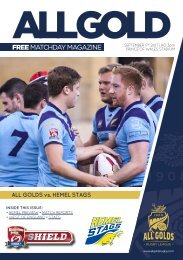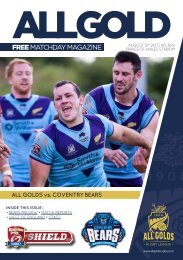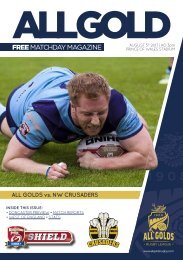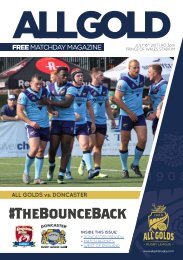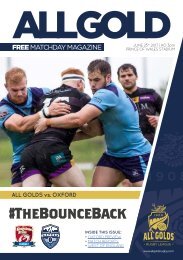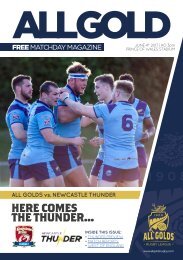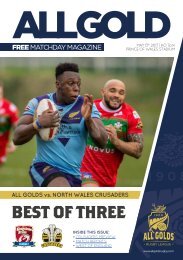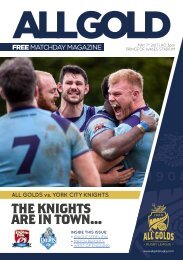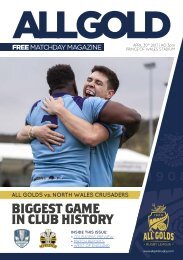All Golds v Oxford KPL1S 2017 Final
Official match day magazine for the All Golds League 1 Shield clash with Oxford
Official match day magazine for the All Golds League 1 Shield clash with Oxford
You also want an ePaper? Increase the reach of your titles
YUMPU automatically turns print PDFs into web optimized ePapers that Google loves.
THERE’S NO SUCH GAME AS RUGBY<br />
(IT’S A PLACE IN WARWICKSHIRE)<br />
WRITTEN BY GEORGE COWBURN<br />
6<br />
What the <strong>All</strong> <strong>Golds</strong> have been playing for the<br />
last five seasons is Rugby (Football) League.<br />
Add two flank forwards and it becomes Rugby<br />
(Football) Union.<br />
So how come there are two similar sports with<br />
the same pitches, goalposts and oval shaped<br />
balls run by two separate and completely<br />
different organisations?<br />
Put at its most simplistic it all boils down to<br />
six shillings - thirty pence to anyone born after<br />
15th February 1971. But there’s more to it than<br />
that.<br />
“Football” as an unregulated free-for-all, often<br />
played by a whole village on public holidays,<br />
existed in this country from medieval times<br />
but it was the public schools, particularly<br />
Rugby, and the Universities that created a<br />
relatively disciplined game from these early<br />
knockabouts.<br />
Incidentally, the legend that William Webb<br />
Ellis in some way invented the game of rugby<br />
is a complete myth which surfaced long after<br />
Webb Ellis’s death.<br />
The Old Rugbeians Society (ex pupils of<br />
the school) examined the claim, including<br />
interviewing surviving old boys from the<br />
period, and could find no concrete evidence to<br />
back the claim up from any source.<br />
It didn’t stop them deciding it was probably<br />
true, however, in a classic example of wishful<br />
thinking.<br />
The early rules of “football” at Rugby school<br />
included being able to catch the ball on the full<br />
and kick it back out of your hands as gradually,<br />
the game emerged into something akin to the<br />
game of Rugby Union now played.<br />
During Victorian times, the game began to<br />
spread from the schools and universities<br />
propelled in part by a piece of Parliamentary<br />
legislation. The 1850 Factory Act decreed<br />
that work had to cease by no later than 2pm<br />
on Saturday afternoon; so what better way<br />
for the miner, docker, foundryman or factory<br />
labourer to spend his Saturday afternoon than<br />
in a game of rugby?<br />
By 1871 the RFU was formed to run the game<br />
based then, as now, at Twickenham - a source<br />
of annoyance to clubs in the north who found<br />
travel to London to attend meetings and<br />
influence matters very difficult.<br />
County Cup competitions began in the 1870s<br />
and, in the north in particular, became very<br />
popular, drawing large crowds for the matches.<br />
Naturally, ambitious clubs wanted the best<br />
players and were prepared to pay for their<br />
services enticing them from other clubs with<br />
cushy job offers and/or cash payments - a<br />
useful source of income in those hard times.<br />
This change from the original social and<br />
amateur ethos alarmed the RFU and its allies<br />
and at the 1886 AGM of the RFU all payments<br />
to players were outlawed - the game was to be<br />
purely amateur.<br />
Generally speaking, the northern clubs (and<br />
some in other areas - the Gloucester club<br />
itself was found in breach of regulations in the<br />
1890s) ignored this rule and rumours regarding<br />
payments were<br />
www.allgoldsrugby.com<br />
@<strong>All</strong><strong>Golds</strong> facebook.com/<strong>All</strong><strong>Golds</strong>Rugby





